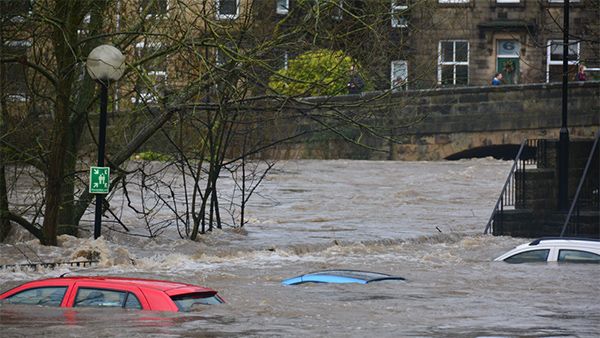Treasury Secretary Janet Yellen Thursday led a panel of top federal regulators in judging climate change to be an “emerging threat” to the nation’s financial stability, releasing tentative recommendations for how agencies should begin preparing to contain the risk.
The report, issued by the Financial Stability Oversight Council — a Treasury Department-led umbrella for regulators including the Federal Reserve and Securities and Exchange Commission — is an important first step in catching up with countries that have gone much further in assessing and addressing climate-related financial risks, a Treasury official said on a call with reporters.
The recommendations focus largely on the collection, analysis and disclosure of data that companies, investors and consumers could use to better identify dangers posed by climate change. Advocates for government action to mitigate climate change have called on financial regulators to incorporate climate-related risks into the so-called stress tests performed annually on the largest banks by the Federal Reserve.
A recommendation by FSOC to use “scenario analysis” — a tool for measuring the risks faced by regulated companies and financial markets — omits any consequences for capital requirements, while representing a step toward stress tests. Scenario analysis “considers a range of possible future climate pathways and associated economic and financial developments,” but doesn’t carry direct regulatory implications, according to the report.
Thursday’s report was adopted by the panel, though Federal Deposit Insurance Corp. Chair Jelena McWilliams abstained in the vote, saying that the panel had not had sufficient opportunity to conduct analysis.
CANNOT WAIT
Yellen said that regulators couldn’t wait for a perfect set of data on climate risks and that Thursday’s report is just a first step. She also said that the long-term sustainability of the financial system relies as well on long-term environmental sustainability.
The report also said that member agencies should consider imposing public reporting requirements on regulated companies, including the disclosure of data on greenhouse gas emissions.
None of the recommendations for FSOC agencies is binding. Some regulators are already developing new regulations, such as the SEC, which is considering requiring publicly listed companies to disclose climate risks.
The document, titled the Report on Climate-Related Financial Risk, is part of a wider government effort put in motion by an executive order signed in May by President Joe Biden. It directed federal agencies to assess risks posed by climate change to their own operations and assets. It also ordered Yellen to direct FSOC regulators to identify threats to financial stability posed by climate change. Yellen is the chair of FSOC.
CRITICAL RECEPTION
The report is likely to attract criticism — both from those who believe regulators are moving too slowly to address climate change and those who see regulators exceeding their legal authority by incorporating climate-related concerns into their oversight of financial institutions.
Activists faulted the report for failing to signal concrete action to blunt the financial risks of climate change.
“The report reads in many places as if the goal is assessment, not mitigation,” said David Arkush, director of Public Citizen’s climate program.
Ben Cushing, fossil-free finance campaign manager at the Sierra Club, said the report shows the FSOC understands the need to prevent climate change from causing the next financial crisis.
‘URGENCY’ LACKING
“However, by leaving out key risk-reduction tools, it is not treating the problem with the urgency it deserves,” Cushing said. He called it “a missed opportunity to recommend actions that actually reduce climate risk and limit Wall Street’s toxic investments in the fossil fuels that are driving the crisis.”
From the opposite side, Republican Sen. Patrick Toomey of Pennsylvania attacked the report well before its release.
“I acknowledge that global warming is real,” Toomey said during a congressional hearing earlier this week. But Democrats, he said, “want to use unaccountable financial regulators to abuse their power and essentially cut off the supply of capital to fossil fuel companies.”
Among other recommendations:
• The formation of two committees: one to coordinate climate work among staff, and another to bring together stakeholders including climate experts, industry representatives, consumers and environmental groups.
• The Federal Insurance Office should “act expeditiously” to analyze the potential for climate change to affect insurance and reinsurance coverage.
• Member agencies should “consider enhancing public reporting requirements for climate-related risks” and “consider whether such disclosures should include disclosure of greenhouse gas emissions.”
• Banking regulators should assess whether rules should be updated “to provide market participants with information on institutions’ climate-related financial risks.”
[More: BlackRock’s proxy move shows limit of dumping bad stocks]
Pandemic accelerated investing based on ESG
The post Regulators warn climate change poses threat to financial stability appeared first on InvestmentNews.








